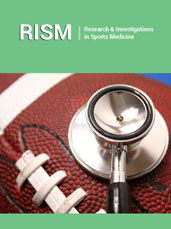- Submissions

Abstract
Research & Investigations in Sports Medicine
Impressions of a Whey Protein Popsicle Among Collegiate Baseball Players
-
Open or CloseSA Cage1*, AP Jacobsen2 and Trail LE3
1The University of Texas at Tyler, USA
2The University of Texas Health Science Center at Tyler, UT Health East Texas, USA
3The University of Texas at Tyler, UT Health East Texas, USA
*Corresponding author:SA Cage, The University of Texas at Tyler, USA
Submission: July 02, 2025;Published: July 10, 2025

ISSN: 2577-1914 Volume11 Issue 3
Abstract
It has been well established that proper nutrition habits play a major role in improving athletic and sport performance. Recently, there has been a shift in popularized diets involving an increased emphasis on protein consumption. Earlier studies suggested that there were individual barriers to proper nutrition including a lack of information, lack of sources nutrition, lack of finances for securing nutrition, lack of time to prepare appropriate meals and distaste for the food and beverage options provided during team activities. This final barrier highlights the importance of taste for increasing consumption of protein supplementation products. Currently, there is a lack of research on the flavor appeal of protein supplementation products used by competitive athletes. Therefore, the purpose of this study was to describe the opinions of collegiate baseball players on a protein supplementation popsicle. A secondary purpose was to describe the effect of the examined product on gastrointestinal health. A total of 46 collegiate baseball players (age = 21 ± 2 years) from an NCAA Division II institution were enrolled in this study. Following weight training sessions, participants were provided with a whey protein popsicle (Whey Good ProteinTM, The Original Protein Shake on a StickTM, Whey Good, West Memphis, AR) to eat. Following consumption of a whey protein popsicle, participants were instructed to fill out an electronic survey that collected information on participant demographics, the participants impression of the protein popsicle and gastrointestinal symptoms following consuming the protein popsicle. 86.9% (N=38) of the participants answered “Like Extremely”, “Like”, or “Like Somewhat” when asked about their overall impressions of the protein popsicle. Out of the 46 participants, only two reported a mild increase in bloating following consumption of the protein popsicle. No participants reported moderate to severe gastrointestinal symptoms after consuming the protein popsicle. This study demonstrated that the tested whey protein popsicle was well received by the tested group of collegiate baseball players. Future research should study the impact of whey protein popsicles muscle performance during exercise and recovery during and after exercise. In the interim, clinicians should seek out protein supplementation options that encourage regular protein intake by their patients.
 a Creative Commons Attribution 4.0 International License. Based on a work at www.crimsonpublishers.com.
Best viewed in
a Creative Commons Attribution 4.0 International License. Based on a work at www.crimsonpublishers.com.
Best viewed in 







.jpg)






























 Editorial Board Registrations
Editorial Board Registrations Submit your Article
Submit your Article Refer a Friend
Refer a Friend Advertise With Us
Advertise With Us
.jpg)






.jpg)














.bmp)
.jpg)
.png)
.jpg)










.jpg)






.png)

.png)



.png)






